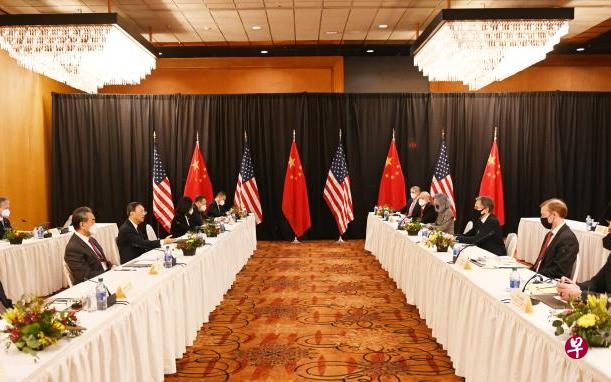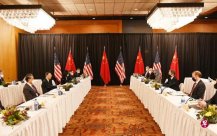
U.S. Secretary of State Brills pointed out at the meeting that China ’s actions in Xinjiang, Hong Kong, and Taiwan, and the economic coercion of the United States allies“ threatened the international order of maintaining global stability ”.Wang Yi, a Chinese State Councilor and Foreign Minister, demanded that the United States "completely abandon the dominant acts that interfere with the internal affairs of China."Sino -US tit -for -tat tit -tit -up speech lasted for more than an hour.
Beijing Special Commissioner
The first Sino -US high -level dialogue since the US President Biden took office. It opened in the accusations and quarrels full of gunpowder. The two sides did not conceal and spread the sharp contradictions.Scholars of interviewees pointed out that the prospects for bilateral relations between China and the United States are not optimistic. The two sides are testing and putting pressure on each other to enter the stage of "who blinked first".
Sino -US high -level dialogue was unveiled on March 18, local time in Alaska, USA, Alaska.U.S. Secretary of State Brills and National Security Consultant Sha Liven, as well as Yang Jiechi, member of the Political Bureau of the Communist Party of China and director of the Central Foreign Affairs Working Committee, and Wang Yi, a Chinese State Councilor and Foreign Minister Wang Yi, held two rounds of talks that day.
In the opening whites of the first round of talks, Brinken first emphasized that the United States will strengthen rules -based international order. Otherwise, the world will become "power and winners, which will make the world more violent and unstable."Essence
He subsequently expressed deep concern for China's actions in Xinjiang, Hong Kong, and Taiwan, as well as the Internet attacks initiated by the United States and the economic coercion of the United States allies, and said that these practices "threatened the international order that maintains global stability -based rules"" ".
Brinken said: "Why is this not only internal affairs, why do we think there are obligations to ask these issues here today."
Shatin shows that the primary task of the United States is to benefit the American people and protect the interests of allies and partners. The United States "does not seek conflict", but welcome "fierce competition."
After speaking in the United States, Yang Jiezheng violently hit with 15 minutes in length, and there were many problems in the United States in terms of human rights and other aspects. "What should be done is to change his image and care about his own affairs."He also said: "The United States is not qualified to talk to China with a high time, and the Chinese do not eat this set."
Wang Yi asked the United States to "completely abandon the domineering act of interference in China's internal affairs", and said that "this old problem in the United States has to be changed."
The opening speeches of the two sides last more than an hour, far exceeding the opening time of the opening of the medium and high -level talks to the media.When the two sides still argued on the issue of the media's departure.
Yang Jieye also questioned the United States on the spot that the United States did not comply with basic diplomatic etiquette. Yan Ci warned the United States: "You are not qualified to say in front of China, you talk to China from the status of strength."
The outside world has previously expected that this will be a difficult dialogue. However, Li Mingjiang, an associate professor of the Nanyang University of Technology, Singapore Nanyang Institute of Technology, said in an interview with Lianhe Morning Post: "The intensity of the conflict, and directly in front of the media directly in the mediaAttacking each other is still unexpected ... Both sides have intentionally exposed the contradictions under the media's sight. "
Some analysts believe that China and the United States in front of the media are in the domestic audience. The Bayeng government tried to show domestic toughness to China, and China had to strongly respond to the recent pressure of the United States.Li Mingjiang said: "Both sides must have a political explanation of each country."
On the eve of the talks this week, the 24 officials, including the 24 officials of the Standing Committee of the National People's Congress, imposed sanctions on the grounds of the 14th National People's Congress. They also issued a subpoena to a number of Chinese telecommunications companies on the grounds of national security.
Li Mingjiang analyzed that the fierce performance of China and the United States also conveyed information to the international community. The United States had to show the allies to the allies to tough China, and China would tell third -party countries that China will not concessions in the wrestling of great powers.
Wu Xinbo, the dean of the Chinese Scholars and Dean of the International Issues Research Institute of Fudan University, analyzed in an analysis that Brinken broke the practice of diplomatic talks and talked about substantial issues in the opening of the consequences. It seemed very unreasonable to China, so it was necessary to make a tough response.
But he believes: "Both sides are noisy, and they still have to have a pragmatic dialogue ... If it is still confrontation and quarrel, this will be a failure dialogue."
The second round of talks are not open to the media Wang Yi responded later: quite smooth
The second round of talks held by China and the United States were not open to the media.Bloomberg quoted U.S. officials that the talks were "essential, serious and direct", and the length exceeded the original arrangement.After the talks, Wang Yi briefly responded to the media and said, "It's smooth" and "talk about many regional issues."Both parties will hold a third round of talks on the morning of the 19th local time.
The tension atmosphere of the first day of talks indicates that the prospects for re -establishment of bilateral relations between China and the United States are not optimistic. The hope of reaching the substantial consensus on both sides is slim.Li Mingjiang judged: "The two sides have to compete for a while ... both sides are testing on both sides, putting pressure on the other party, forcing the other party to make concessions first.
■ Analysis: China and the United States must show the tough attitude to the people ■ China and the United States refer to each other's violation of diplomatic etiquette Press 4



